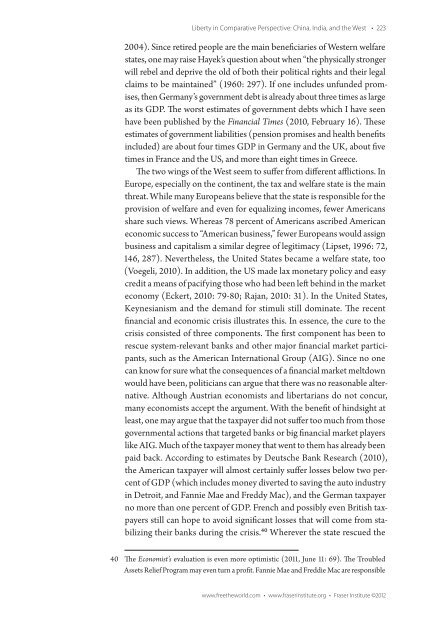Towards a Worldwide Index of Human Freedom
Towards a Worldwide Index of Human Freedom
Towards a Worldwide Index of Human Freedom
Create successful ePaper yourself
Turn your PDF publications into a flip-book with our unique Google optimized e-Paper software.
Liberty in Comparative Perspective: China, India, and the West • 223<br />
2004). Since retired people are the main beneficiaries <strong>of</strong> Western welfare<br />
states, one may raise Hayek’s question about when “the physically stronger<br />
will rebel and deprive the old <strong>of</strong> both their political rights and their legal<br />
claims to be maintained” (1960: 297). If one includes unfunded promises,<br />
then Germany’s government debt is already about three times as large<br />
as its GDP. The worst estimates <strong>of</strong> government debts which I have seen<br />
have been published by the Financial Times (2010, February 16). These<br />
estimates <strong>of</strong> government liabilities (pension promises and health benefits<br />
included) are about four times GDP in Germany and the UK, about five<br />
times in France and the US, and more than eight times in Greece.<br />
The two wings <strong>of</strong> the West seem to suffer from different afflictions. In<br />
Europe, especially on the continent, the tax and welfare state is the main<br />
threat. While many Europeans believe that the state is responsible for the<br />
provision <strong>of</strong> welfare and even for equalizing incomes, fewer Americans<br />
share such views. Whereas 78 percent <strong>of</strong> Americans ascribed American<br />
economic success to “American business,” fewer Europeans would assign<br />
business and capitalism a similar degree <strong>of</strong> legitimacy (Lipset, 1996: 72,<br />
146, 287). Nevertheless, the United States became a welfare state, too<br />
(Voegeli, 2010). In addition, the US made lax monetary policy and easy<br />
credit a means <strong>of</strong> pacifying those who had been left behind in the market<br />
economy (Eckert, 2010: 79-80; Rajan, 2010: 31). In the United States,<br />
Keynesianism and the demand for stimuli still dominate. The recent<br />
financial and economic crisis illustrates this. In essence, the cure to the<br />
crisis consisted <strong>of</strong> three components. The first component has been to<br />
rescue system-relevant banks and other major financial market participants,<br />
such as the American International Group (AIG). Since no one<br />
can know for sure what the consequences <strong>of</strong> a financial market meltdown<br />
would have been, politicians can argue that there was no reasonable alternative.<br />
Although Austrian economists and libertarians do not concur,<br />
many economists accept the argument. With the benefit <strong>of</strong> hindsight at<br />
least, one may argue that the taxpayer did not suffer too much from those<br />
governmental actions that targeted banks or big financial market players<br />
like AIG. Much <strong>of</strong> the taxpayer money that went to them has already been<br />
paid back. According to estimates by Deutsche Bank Research (2010),<br />
the American taxpayer will almost certainly suffer losses below two percent<br />
<strong>of</strong> GDP (which includes money diverted to saving the auto industry<br />
in Detroit, and Fannie Mae and Freddy Mac), and the German taxpayer<br />
no more than one percent <strong>of</strong> GDP. French and possibly even British taxpayers<br />
still can hope to avoid significant losses that will come from stabilizing<br />
their banks during the crisis.40 Wherever the state rescued the<br />
40 The Economist’s evaluation is even more optimistic (2011, June 11: 69). The Troubled<br />
Assets Relief Program may even turn a pr<strong>of</strong>it. Fannie Mae and Freddie Mac are responsible<br />
www.freetheworld.com • www.fraserinstitute.org • Fraser Institute ©2012


